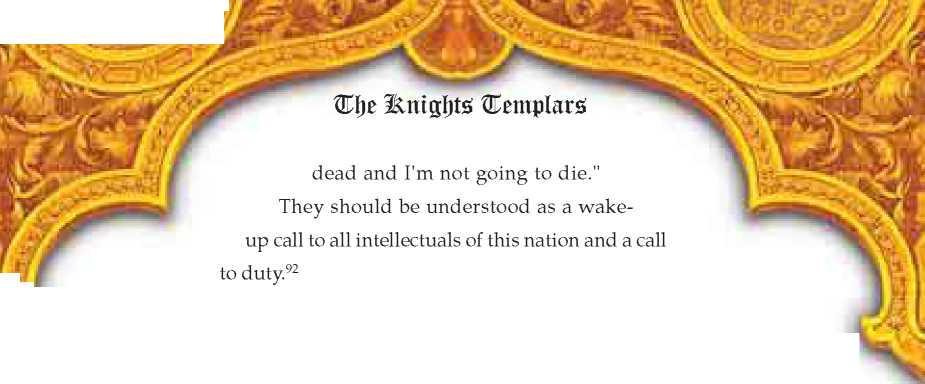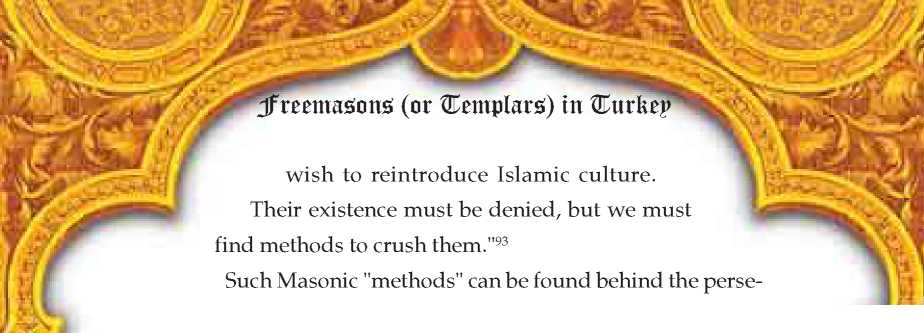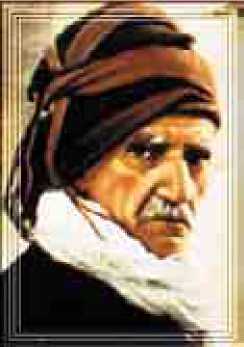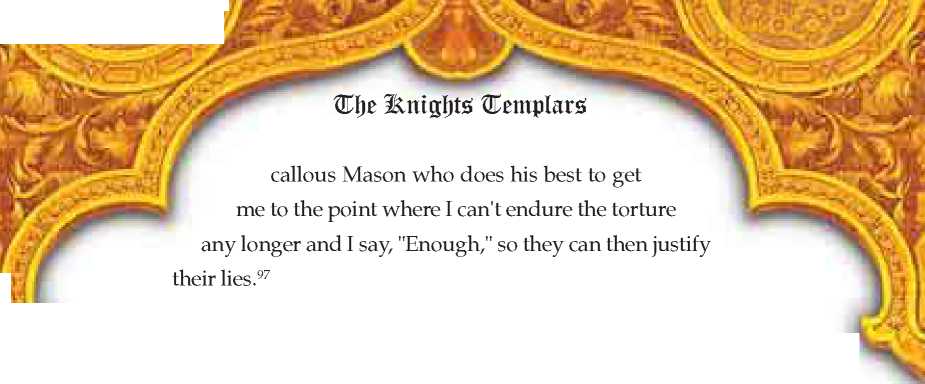As the preceding chapters established, Masonry has traditionally represented the anti-religious front. The Templars, having left Christianity and adopted deranged teachings, then engaged in their historic war against Christianity. Over the centuries, the war against religion in Europe has been fought under the leadership of Freemasonry, heir to the Templars, operating in Turkey and actively trying to impose positivist and materialistic philosophies on the masses to encourage anti-religious sentiments.
We can read the Masons' antagonistic views on religion, including their recommended action plan, in articles printed in their own publications. For instance, one says, "For as long as the Madrasahs [religious schools] and the Minarets are not destroyed and the scholastic ideas and dogmatic beliefs not eliminated, the captivity of thought and suffering in the conscience will continue."91 From the words of Grand Master Haydar Ali Kermen,
Masonry's dislike of religious institutions becomes obvious::
The totally improper screeching calls to prayer from mosques in the vicinity of the Parliament, are nothing but a scream saying, "I'm not dead and I'm not going to die."


They should be understood as a wake-up call to all intellectuals of this nation and a call to duty.92
The Islamic call to prayer is a "screeching" reminder to the Masons, calling them to duty. To silence the religion that's declaring "I'm not dead" is their greatest duty.


In their fight against religion and religious morality, Masons have used a number of different strategies. The Halkevi and the Village Institute were two of these. Yet others were Mason-controlled media and book publishing. Beginning with Abdullah Cevdet, the Masons have continued this tradition in the Republican period with authors like Cemil Sena Ongun and Orhan Hancerlioglu, both master Masons of the highest degree. In Hz. Muhammed'in Felsefesi (Prophet Mohammed's Philosophy), Cemil Sena Ongun writes—indirectly but very insistently—that the Prophet Mohammed (may God bless him and grant him peace) invented Islam. (We absolve Islam of such allegations) In books like Toplumbilim Sozlugu (Dictionary of Social Sciences) and Islam Inanclari Sozlugu (Dictionary of Islamic Beliefs), both used as references at universities, Grand Master Orhan Hancerlioglu slanders religious authorities and makes unfounded allegations against people of religious importance in his quest to further his atheist and anti-religious views. As a result of all these Masonic theories and propaganda, whole generations of atheist intellectuals have arisen. Because they adopt a materialistic and anti-religionist world view and believe in Darwin's theory of evolution like a religion, they believe themselves to be progressive and science-oriented. But in reality they live in ignorance, and arrogance is their trademark.
The Masons' activities to separate the Turkish people from their religion has another dimension: oppression. A little
Booklet by the lodge says that "Hidden cultural elements of Islamic origin in our society


Wish to reintroduce Islamic culture.
Their existence must be denied, but we must find methods to crush them."93 Such Masonic "methods" can be found behind the persecution of great Islamic thinkers like Sehbenderzade Filibeli Ahmed Hamdi, Iskilipli Atif Hoca, Bediuzzaman Said Nursi and Suleyman Hilmi Tunahan in the last century. In various parts of his book Risale-i Nur,
Bediuzzaman Said Nursi refers to the forces opposing Islam:
... the greatest damage to the nation and to Islam has been done by Masonry, Communism and athe


Ism.9
Islamic scholar Bediuzzaman Said Nursi was one of Turkish Masonry's main targets
... Masonry, Communism and atheism create anarchy, and the only thing that can stop these forces is Islamic unity and the guidance of the Qur'an.95
On another occasion, Bediuzzaman says about the Masons' animosity to religion:
A certain group, intent on severing the 1,000-year-old link of the Muslim Turks to their religious values, says; "We no longer believe in God as the purpose. We have created our own purpose. Our purpose is not God, but Mankind."96
This quote of Bediuzzaman's can be traced to an article printed in Mesriki Azam Ictimai Zabitlari (Grand Lodge Inner Proceedings) in 1923. The "certain group" Bediuzzaman referred to is undoubtedly the Masons, with their belief in secular humanism.
In Risale-i Nur, this great thinker mentions the personal enmity, injustices and oppression the Masons subjected him to:
The sufferings I have to endure here in one day are
M * •
I more than what was done to me in one month V'l while I was in Eskisehir. They have sent a
F//
Callous Mason who does his best to get me to the point where I can't endure the torture any longer and I say, "Enough," so they can then justify their lies.97


In Bediuzzaman's Son Sahitler (Last Witnesses) he explains that he was imprisoned unlawfully because of the Masons and tells of the hardship and sufferings they made him endure. In Fourteenth Ray, he refutes the allegations made against him by the hostile Masons. The court did not accept the view that Bediuzzaman had secret enemies, but he replied that the court was wrong and that Masons and Communists regarded him as their sworn enemy. He went on to say that his mission in the Risale-i Nur Collection had been only to prove the existence of God and to protect Islamic faith against the anti-religion movement.
From closer inspection of a letter he wrote, it is evident that the forces behind the campaign against him were Masons and Communists:
I took a look at politics three times in recent times. As I said in my defense, two-faced elements in the pay of the Masons and the Communists used bribery and pressure to mete out torture on me in order to crush my resistance. But now I'm feeling a new breeze in society, though I couldn't look any closer, for my profession forbids this.98

Bediuzzaman was explaining that his specific mission was to save faith, to fight against Masonry, irreligion, and the anti-religion lobby. With these famous words, he advised his pupils to be positive, because their struggle would be rewarded with success and Islam would be the strongest voice in the land: "Yes, be hopeful! The loudest and strongest voice in the coming upheavals and changes will be that of Islam!" 99
Since Bediuzzaman's era, the Masons, fearing that Islam would again be "the loudest and strongest voice in the land," have continued their war of propaganda against religion. This war actually began




 World History
World History









